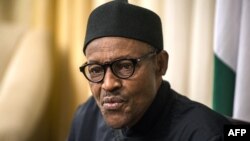In the first month since his inauguration, Nigerian President Muhammadu Buhari has tweaked military strategy and shaken up the state oil company, but has yet to appoint a Cabinet.
During his campaign, Buhari vowed to bring change to Nigeria, but did not give a timetable for when that would happen.
So far, Buhari’s tenure has been marked as much by what he has not done as by what he has. He has not appointed any ministers, nor even circulated a list of names. His biggest moves thus far have been to fire the board of the Nigerian National Petroleum Corporation, the state-owned oil company that has been dogged for years by allegations of corruption. He also ordered the military command to relocate to the northeastern city of Maiduguri, a frequent target of the violent Islamist Boko Haram insurgency that he has pledged to crush.
Much work ahead
But much remains to be done. Nigeria’s treasury has been ravaged by a global drop in the price of crude oil, the country’s top commodity. Buhari himself says the treasury is “virtually empty.” And Boko Haram is as deadly as ever. It has carried out numerous suicide bombings and gun attacks in Maiduguri and elsewhere in the northeast since the president’s May 29 swearing-in.
The spokesman for Buhari’s All Progressives Congress party says the president is dealing with an unprecedented situation. His victory over former president Goodluck Jonathan in March was the first time an opposition candidate succeeded in defeating an incumbent Nigerian president through an election, and it marked the end of a 16-year grip on the presidency by the Peoples Democratic Party. Lai Mohammed says Buhari is assessing the state of Nigeria’s vast federal government before he appoints ministers.
“Mr. president is taking his time, but I can assure you, there’s really not too much damage that’s been done to governance,” Mohammed said.
Reality check
Political commentator Chris Ngwodo says Buhari may have had to curtail any grand plans he might have once had, now that he is in office.
“While the initial intention and certainly everybody’s hope was that the new administration would hit the ground running, when they got there they realized that the true state of things was worse than they had previously anticipated,” Ngwodo said.
And all the rhetoric about the economy may be one way for Buhari to mitigate the public’s high hopes for his administration.
“During the course of the campaign he made the expectations. Now they have to manage those expectations, and one of the ways of managing them is to stress that the federal treasury is in very bad shape,” Ngwodo said.
Sadeeque Abba, a lecturer of political economy at the University of Abuja, says President Buhari’s past experience as petroleum minister and then as a military ruler speaks to his history of slow, methodical governance.
“He is unpredictable, he is highly unassuming, he plays by the rules, and he takes his time to understand the nitty-gritty of the challenges and the process that may likely come out of these particular challenges, if he initiates the proper solutions,” Abba said.
This approach may not work for everyone. A spokesman for Buhari said on Wednesday that no Cabinet announcements are likely before September. That sent stocks in Africa’s largest economy tumbling.












